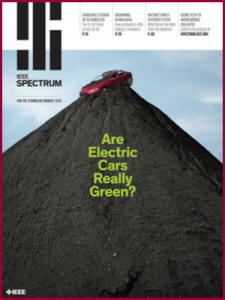The cost of electric cars and other expensive green technologies reveals their hidden environmental impacts, according to two new articles published in IEEE Spectrum. The first report, Unclean at Any Speed, describes how the subsidies for electric cars may cause more harm than good after considering full electric vehicle life cycles. It advocates directing electric vehicle subsidies toward initiatives such as emissions testing, bicycle infrastructure, public transit and land-use changes.
The second article, a response to electric car proponents published yesterday in the same journal, describes how the high cost of electric cars and solar cells exposes the substantial amount of fossil fuels that their manufacturing employs.
The author, Ozzie Zehner, is a visiting scholar at the University of California – Berkeley and the author of Green Illusions . Zehner once built his own electric hybrid, but is now more cautious about promoting costly high-tech strategies.
“Stating that an electric car is clean is like saying that a light bulb is clean. Light bulbs do not produce exhaust, but it doesn’t mean we can use them with zero emissions. The same holds true for electric cars,” said Zehner in an NPR interview Monday.
In his article, Zehner identifies the so-called price tag predicament. “The cost of manufactured goods ultimately boils down to two things: natural resource extraction, and profit,” explains Zehner. “Extraction is largely based on fossil-fuel inputs. Generally speaking, if a supposedly green machine costs more than its conventional rival, then more resources had to be claimed to make it possible.”
He indicates that pricey green technologies, including solar cells and electric cars, likely require more fossil fuel and produce more carbon dioxide than their conventional counterparts produce. Zehner warns that even if electric car costs come down, “we will have invested billions of dollars to maintain an otherwise unsustainable transportation infrastructure.”
Zehner remarks that researchers could instead “measure the virtues of electric cars against those of walkable neighborhoods, and the costs of generating more energy against the savings from using less.”
He admits to seeming contradictions here but adds, “In a world of 7 billion people living in increasingly precarious times, these are the tough questions that matter.”


